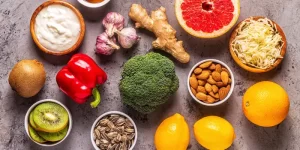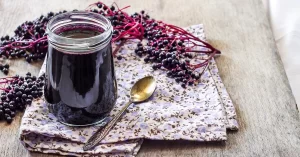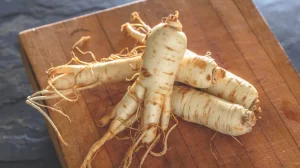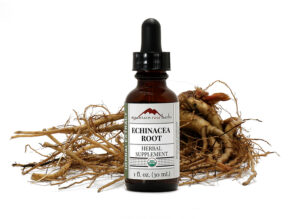The common cold is an all-too-familiar problem that often strikes during the colder winter months. Even though we don’t have a traditional winter here in South Florida, we still have a cold and flu season that generally runs from October to May. As the temperatures drop, millions of people find themselves succumbing to a variety of viruses (rhinovirus, parainfluenza, seasonal coronaviruses, etc) that can result in cold-like symptoms ranging from a runny nose to a sore throat, to mild congestion. According to the Centers for Disease Control, the average adult experiences some type of cold-like virus two to three times a year, making it a very common occurrence. So what supplements can you take if you have a cold?
Over-the-counter cold medications can help but may not always work. Fortunately, there are some natural alternatives from vitamins to herbal remedies that have shown promise in easing cold severity, shortening the duration, and possibly even preventing colds altogether.
Here are the top 5 supplements you can take for the common cold:
Vitamin C:

Vitamin C is a well-known supplement often used for combatting the common cold. While vitamin C can be found in such foods as citrus fruits, broccoli, and peppers, high doses of vitamin C are what is recommended for the prevention of the common cold. It is recommended that you consume no more than 2000mg of Vitamin C per day.
Evidence
Studies suggest that vitamin C might boost certain aspects of your immune function, making it a potentially useful aid in fighting colds. Notably, athletes who regularly use vitamin C supplements appear to have a reduced risk of catching colds.
Side Effects
High doses of vitamin C, especially those recommended for cold prevention, can cause gastrointestinal discomfort and, in some cases, lead to diarrhea. Care should be taken, particularly when considering high doses of vitamin C for children.
Precautions
While vitamin C may not be a guaranteed remedy, consistent use might be better than starting after a cold has already set in. Regular supplementation could lead to shorter cold durations with milder symptoms.
Elderberry:

Elderberry contains a substance known as flavonoids which seem to have anti-inflammatory properties. Elderberry is also a good source of Vitamin C. It’s usually sold over the counter as a syrup or lozenge. As of this writing, there is no standard known dosage for Elderberry.
Evidence
Studies have suggested that taking elderberry as a supplement might help shorten the duration of flu-like symptoms. The berries’ antibacterial and antiviral properties may aid in speeding up recovery. There is also promising evidence that elderberry could boost the production of certain immune cells and hinder a virus’ ability to spread.
Moreover, elderberries have antioxidant properties, and elderberry extract has outperformed placebo in reducing the duration and severity of colds.
Side Effects
While elderberries show promise, it’s crucial to exercise caution. The efficacy and safety of elderberry remains uncertain due to the limited number of studies. One important caution is that elderberries must be cooked appropriately for homemade preparations, as improperly cooked berries can lead to nausea or in severe cases, cyanide toxicity.
Precautions
While elderberries may potentially reduce the symptoms of colds and flu, the evidence is still preliminary. The poisonous nature of the elderberry plant demands careful handling and preparation, making it crucial to purchase reputable, safe elderberry supplements from reliable sources.
Ginseng:

Ginseng is known to function as a mild stimulant but also might help combat the common cold and flu. It is believed that the active ingredient in American and Asian Ginseng known as Ginsenosides helps to play a role in fighting against the common cold.
Evidence
Studies suggest that the American and Asian Ginseng species may boost the immune system. Research indicates that ginseng can increase immune cell counts in the blood, leading to a more robust response to the flu vaccine. This suggests that ginseng might help reduce the risk of catching a cold or flu and may support vaccination efforts.
Side Effects
When used short-term, American ginseng is generally safe, but some individuals may experience headaches. Side effects can also include nervousness, diarrhea, or insomnia. Women may notice an increase in menstrual flow while on Ginseng. Ginseng overall however is generally well-tolerated.
Precautions
American ginseng is possibly unsafe during pregnancy due to potential congenital disabilities linked to one of its chemicals. Also, its safety during breastfeeding is uncertain, so it is best to avoid its use if breastfeeding. Moreover, ginseng products may mimic estrogen, so avoid them if you have hormone-sensitive conditions.
Zinc:

Zinc has traditionally been very popular as a potential remedy for the common cold. Zinc is available in various forms such as Zinc Acetate, Zinc Citrate, Zinc Gluconate, Zinc Picolinate, and Zinc Sulfate. The max dosage of Zinc per day is 40mg for adults. It is also recommended to take Zinc with food every 2-3 hours within the first 48 hours of symptom onset.
Evidence
Research has shown that taking zinc, either as a syrup or lozenge, during the initial cold days can help shorten the duration of upper respiratory infections. A comprehensive review of 15 studies revealed that zinc supplementation might even play a preventive role, reducing the likelihood of catching a cold over approximately five months.
Zinc lozenges have shown promise in limiting virus replication at the nasal epithelium and reducing respiratory tract inflammation. When taken throughout the day (75–95 milligrams of zinc per day) and initiated within 24 hours of symptom onset, they may decrease the duration of a cold by 2–4 days.
Side Effects
While zinc lozenges can offer relief, they may also cause side effects. Some individuals may experience nausea and dysgeusia (a change in taste perception) while taking Zinc. These symptoms typically subside once the supplementation stops.
Precautions
Taking more than the safe upper limit of Zinc may lead to adverse effects such as vomiting, nausea, diarrhea, headaches, loss of appetite, or stomach cramps.
Echinacea:

Echinacea contains several compounds that may provide therapeutic effects. They include polysaccharides, glycoproteins, alkamides, volatile oils, and flavonoids. There is no standard known dosage for echinacea.
Evidence
While some studies do not support its efficacy as a treatment, others have found that it can reduce the duration and harshness of colds by approximately 10% to 30%. Research also suggests that it can reduce the risk of catching a cold and shorten its length.
Side Effects
Echinacea is generally well-tolerated, but it comes with some mild risks. As mentioned earlier, individuals with specific allergies and immune-related conditions should avoid echinacea or seek medical advice before using it. While the supplement is largely safe, there is a potential for allergic reactions in some individuals.
Precautions
Taking echinacea daily may reduce the risk and duration of upper respiratory infections. It’s important to purchase Echinacea from a reputable source as oftentimes the active ingredients may not be found in supplements that are purchased, despite being written on the label.
While there’s no magic cure for the common cold, supplements can offer valuable support in easing discomfort and speeding up recovery. Vitamin C, elderberry, ginseng, zinc, and echinacea are among the top contenders in your cold-fighting arsenal. As always, consult with your primary care provider before adding any supplements to your regular routine.
Dr. Sergio Guiteau is a physician who is board certified in Family Practice and Sports Medicine with added certifications in Aesthetic Medicine. He specializes in Preventive Medicine, Sports Medicine, and Anti-Aging Medicine and blogs on Advancedrejuv.com/blog

